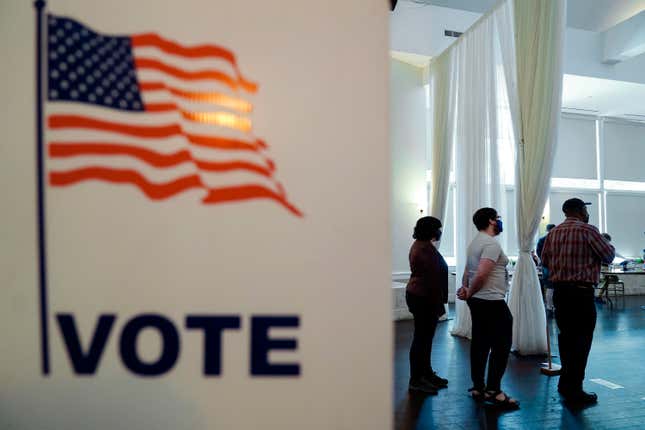
Before the Supreme Court struck down the constitutional right to abortion, conservative legislatures in Texas and elsewhere devised a legal scheme to circumvent that right. It hinged on passing laws that would have been unenforceable by state or local governments, and then deputizing individual citizens motivated by their own zealotry to bring potentially costly civil lawsuits against anyone seeking an abortion or anyone helping them. The tactic killed two birds with one stone: giving the government cover by taking it out of the business of patrolling wombs while still accomplishing a long-help political and goal of the right.
The strategy might seem meaningless now that the Gilead states are free to pass any abortion restrictions they please. But Republicans are repurposing it to wage war on another political front: voting rights. In Georgia, private citizens are challenging and in some cases succeeding in getting thousands of voters purged from the state’s voter registration rolls, the Atlanta Journal-Constitution reports. The challenges are being brought under a provision in the voting law passed last year by the state’s GOP-controlled legislature which allows individuals to challenge the validity of an unlimited number of voter registrations within the county where they live, then forcing whose who wish to remain on the rolls to defend their right to be there.
The voter challenges could be the most pivotal part of the law, which like similar laws elsewhere, was motivated by a myth pushed by many Republicans of widespread voter fraud, particularly in the 2020 election cycle. In Georgia and elsewhere, no such widespread fraud has ever been found, but that didn’t stop Republican legislators from passing the measure, which also limits the number of absentee ballot drop-off boxes in many areas, requires voter ID and even outlaws providing food and drink to people waiting to vote in long lines in Georgia’s oppressive heat.
Georgia already has a process by which election officials can identify and remove people who may no longer be eligible to vote (for example people like me who once lived there but moved and now vote elsewhere). But its legislature has apparently figured out that as with Texas’ abortion strategy, deputizing individuals to challenge their neighbors’ voting rights is more efficient at suppressing votes while keeping the government officials’ hands out of the mud.
From the Atlanta Journal-Constitution
It’s voter against voter, with conservatives taking matters into their own hands to police Georgia’s voter list...
...Georgia already had some of the nation’s most rigorous voter cancellation practices, removing nearly 1 million outdated registrations over the past five years, including 534,000 in 2017, which is believed to be the largest mass cancellation in U.S. history.
But federal and state laws call for a deliberate process that can take several years to cancel voter registrations. The government mails letters to voters whose addresses have changed, and those who don’t respond can be removed if they miss the next two general elections. Those who confirm they’ve moved are canceled without delay.
Voter challenges provide a method to speed up cancellations.
The AJC cited voting rights group Fair Fight Action in saying that more than 25,500 voter registrations have been challenged and 1,800 removed this year under the process. Although it’s technically a nonpartisan affair, it stands to benefit conservatives more than progressive candidates since conservatives are more likely to believe in 2020 election conspiracy theories and therefore more likely to be suspicious of their neighbors’ voting legitimacy.
And if the strategy succeeds, expect to see it rolled out in other states before the 2024 presidential race.

